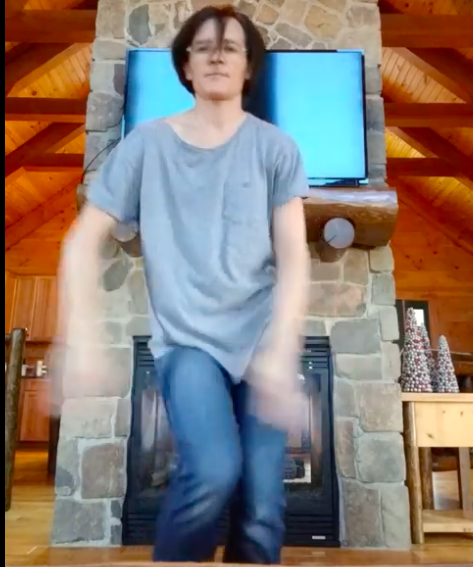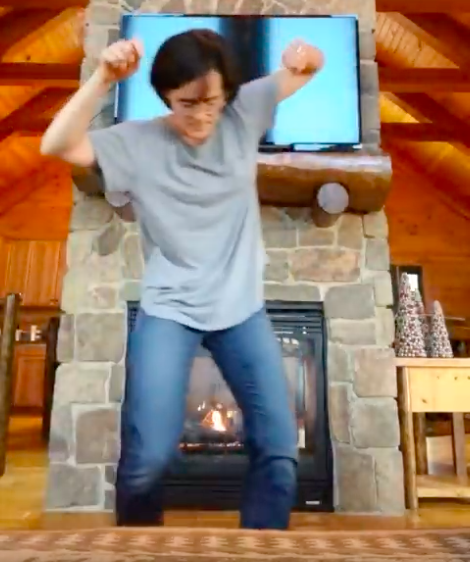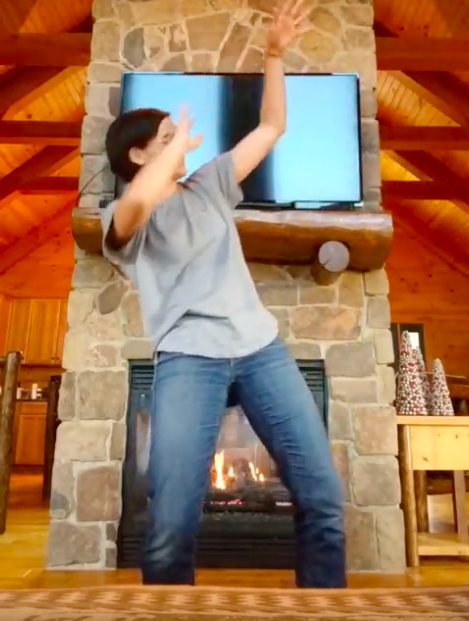Being an ageist, it's not cool, right? The first step to not being an ageist is to examine how you view yourself. I think ageism is quite common in US society. People are often self-limiting in what they pursue and what they routinely do simply because of the number of years under their belts. It's likely that if it's not something you actively think about or have noted in society, that it is present in your life.
Our society gives us this imprint and expectation of behavior that we tend to fall in line with and don't question. Questioning, by the way, is something we can do in our minds or with our actions. I've observed that in the US getting older means that hanging out with friends no longer means going to the park, or running around the block, or going on a bike or skateboard adventure, climbing a tree, or building a fort like it did during our youth. It means things like getting coffee, going out to eat, and watching TV or a movie, or sitting at a concert. Our communal time becomes less active and increasingly sedentary.
Also the types of movements we do become less and less playful, more rigid and predictable, less demanding of balance and coordination, and overall slower and slower. Physically it means that our body is less adaptable to face the challenges of the world whether that's moving quickly to catch something that's dropping or falling, running across the street to get out of the way of a car or get a child out of the way of a car, catching ourselves from a slip and trying to prevent a fall, impaired balance and coordination, and later in life as a senior reaching for high objects off the shelf, lifting something overhead, getting out of bed or off the floor. Yes! I’m not exaggerating - a lot of the problems I see in older patients comes from this ageist attitude and habits. Our body responds to what we do, so less and less activity means more and more limitation. I see this behavior in younger patients, even though the habits often haven’t yet caught up with them, but sometimes it has, well before they are a senior. It makes me sad. But it’s also something we can change!
Our body thrives with variety. These good bits of stress, allow our body to make adaptations - adaptations such as quicker reflexes, better movement patterns, better proprioception which is knowing where your body is in space. As a result, our tendons and muscles are stronger in more varied positions and speeds. This is important because, injuries in daily life usually occur at higher rates of speed, so integrating faster movements into our regular life and training (once we have good movement patterns established at lower speeds), decreases this likelihood of injury in our everyday lives.
Ageism has negative consequences for us not only physically, but also emotionally and mentally. Mentally it's limiting because we've decided certain things aren't for us because of our age. We've decided that's for young people, we're too old for that, we'd be too silly or look too silly, we wouldn't do well at it. So we do less. How we live part of our life is how we live our whole life. If we limit ourselves physically, we are doing it mentally, and emotionally. We are not challenging ourselves.
Emotionally we miss out as well when we don't have playful movement such as dancing, or roller skating, or playing tag, games, or wrestling with children or grandkids. Brene Brown, a social worker and vulnerability/shamre researcher, can tell you more about this in her book, "The Gifts of Imperfection." In her 10 Guideposts to living whole-heartedly, a.k.a happily, (based on her research), you will find play as one of the required components to living this better life. You can also learn more about her research in her TED talks and now on her Netflix special.
Are you an ageist? Are you limiting yourself simply because of your age and what folks around you are doing? I don't want to be an ageist, not of my patients and my clients, nor of myself. This starts with how I view myself. In order to do this, I need to not view myself through an ageist perspective. What are some things that I do to combat this? I skateboard from my car to my classes as a graduate school instructor at USC. This alone makes me feel ~20 years younger. I snowboard. I adventure and play in the mountains doing things that get me dirty, require me to adapt to the environment, expose me to weather and natural elements, and make me work different every time. I climb, run, and mountain bike in the mountains.
One of the most recent areas of growth for me in this area has been incorporating a discipline of regular dance in my life. This is not choreographed, group movement. I throw myself regular dance parties, often in my living room, or the living rooms of friends. The music goes on and I let my body be creative and explore in response to the beat, the melody, the lyrics. It's been so fun, freeing, and even healing for me. I feel the change in my body, my mind, my emotions, and even my spirit. Every know and then if you follow me on social media, I share some of this dancing, because I want to break down these ageist walls we've built up or allowed to be built up around us, that keep us imprisoned in this limited mindset and perpetuates this negative belief in society.
I started this simply. It didn’t require any additional equipment. Just a little bit of space, my phone, and a song that I can move to. Early on it was simply one song after a work day. Often times I’d find myself feeling better and playing more songs. Now I have a “Daily Dance Party” playlist I’ve created on my phone. I’ll put it on shuffle and have built up to 20 minutes that I incorporate into my 20 minute of daily cardio. This has been so good for my mood and outlook and incorporates unpredictable, varied movements, balance, coordination to balance out things that are more predictable - running, swimming, biking for cardio.
What steps can you take to be less of an ageist? Remember it starts in your own life and how you're limiting yourself. As you try more activity, be wise - start slowly, give your body time to adapt, and get help (perhaps PT) if you need to get some basic, foundational movement - strength, coordination, mobility - down.
Together, Let’s Get Moving!
Liz




